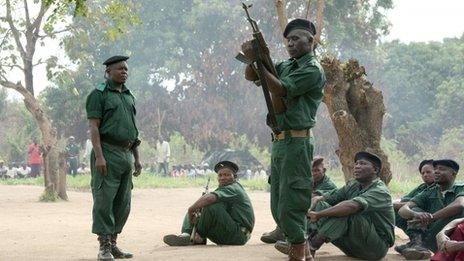Mozambican ex-rebels Renamo in police clash
-
Published

At least five people in Mozambique have been killed after members of the opposition party Renamo, an ex-rebel movement, attacked a police post.
The incident in the central town of Muxungue followed two police raids on Renamo gatherings earlier in the week.
The police said the meetings were military training seminars organised to destabilise the country.
Renamo has said it will boycott local elections in November and intends to disrupt them.
The party says it feels the electoral process is fundamentally flawed.
Renamo and the governing Frelimo party fought against each other during Mozambique's 16-year brutal civil war, which ended in 1992.
'Tired of persecution'
The police said one woman and four officers died in the raid in Muxengue and 10 policemen were injured.
Renamo said it launched the attack in retaliation for the police raids on meetings they were holding in the towns of Gondola and Muxungue.
"Renamo is tired of persecution, humiliations, repression, dictatorship and slavery," AFP news agency quoted Renamo's security chief Ossufo Momad as saying.
A force of about 300 Renamo men have remained armed since the 1992 peace deal, despite efforts to integrate them into the army or police force.
Renamo leader Afonso Dhlakama says he needs his own personal bodyguards, and the men usually stay in his bush camp in the Gorongosa mountains in central Mozambique.
The BBC's Jose Tembe in the capital, Maputo, says this week's clashes have created an atmosphere of fear and rumour.
Some people in Muxengue and Gondola have fled their homes fearing further clashes and there is little traffic on the main highway between the central region and the capital, which is in the south of the country, he says.
National elections are due next year.
Mr Dhlakama took 16.5% of the vote in election in 2009 - the fourth time he had lost since the end of civil war.
-
-
Published25 March 2013
-
-
-
Published4 April 2013
-
-
-
Published15 January 2015
-
-
-
Published28 March 2013
-